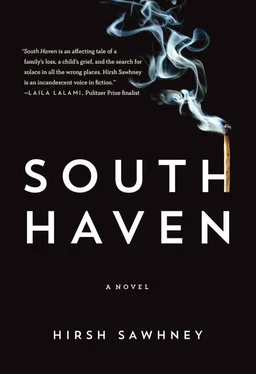These first two calls put Siddharth in a good mood. Then the phone rang for a third time. It was Barry Uncle. Fourteen months had passed since Mohan Lal had had a real conversation with Barry Uncle. Eighteen months had passed since the last time they’d stayed up late drinking Scotch and eating pink pistachios, getting louder with each passing hour, talking trash about Gandhi and Nehru, calling them British stooges. Just the other day, Siddharth had remembered a joke Barry Uncle once told about a Sikh man who didn’t know how to use a modern toilet, so he wrapped his shit in a bedsheet and flung it out the window. This joke made Mohan Lal laugh so hard that tears started trickling from his light-brown eyes. Siddharth wanted his father to laugh like that again. He had Marc Kaufman now, and he wanted his father to have someone too.
He tried passing the phone to his father, but Mohan Lal gave him a wide-eyed glare, a look of death usually reserved for Arjun. Siddharth said, “Don’t look at me like that.” Mohan Lal told him not to stick his nose in other people’s business. Siddharth said, “Dad, it’s my business if you’re all depressed all the time. It’s my business if you’re gonna be such a loner.”
Mohan Lal raised his hand behind his ear. “What did you call me? Listen, it’s okay for someone at my stage to keep his own company. You’re the one I’m worried about. You’re the one who’s lost all his friends.”
That night, as Siddharth tried to fall asleep, he felt a strong sense of loathing toward his father. He wished the man had actually hit him. Mohan Lal had hit Arjun a few times, and Siddharth thought that something about the pain might make him stronger. As he tossed and turned, he made another wish. He wished that he could disappear for a few days, just so his father could get a small taste of life without him.
Waking up in the middle of the night, he suddenly regretted these horrible thoughts. He regretted saying such horrible things to his father. He imagined Mohan Lal all alone on the sofa, sipping Scotch and staring at the television, his eyes glassy and dazed. Meanwhile, Siddharth would be out having fun with Marc.
In the morning, Siddharth watched cartoons by himself and woke his father up at ten. He served them Pop-Tarts and orange juice for breakfast as a way of making up. As they ate in the dining room, Siddharth declared that he was canceling his sleepover.
“But you’ve made a commitment,” said Mohan Lal. “A man must honor his commitments.”
“Just forget it, Dad. You can’t force me.”
“It’s your life, son. If you want to ruin it, it’s your decision.”
Siddharth grunted. “Fine. But at least put on some real clothes. You’re not dropping me off in those stupid sweatpants.”
* * *
Before they left for Marc’s, he flipped through the TV listings and drew little stars next to programs that might interest his father. Mohan Lal told him not to bother. He said he would use the peace and quiet to work on his book. As they headed down Route 114 toward Woodford, Siddharth found comfort in his father’s words. Mohan Lal was supposed to be working hard on his book, but he’d barely devoted any time to it lately. Maybe it was a good thing that Siddharth was going out. Maybe he was actually doing his father a favor by hanging out with Marc. The van skirted Foster Farm, the second oldest farm in the country, and his fear and guilt began to fade. He was growing excited for his time with Marc Kaufman. The kid was undeniably cool, and it seemed that he liked him — or at least didn’t think he was a total loser.
For almost eight weeks now, the two families had been carpooling. On Tuesdays, Mohan Lal picked up the boys after their karate lesson, dropping Marc off in Woodford so that Ms. Farber could attend a meditation class at the Jewish Community Center. On Thursdays, Ms. Farber drove Siddharth straight from Deer Run to the dojo, picking up Marc from her house en route. Thanks to this arrangement, Siddharth got to spend one less day per week at his hellish after-school program.
He was jittery the first couple of times he walked toward Ms. Farber’s Saab in the Deer Run parking lot. What would people say if they saw him cozying up to the school psychologist? Would they think he’d gone crazy? And there were other worries too. It was one thing to talk about his mother in Ms. Farber’s office. But what if she brought her up on the way to karate? Fortunately, Ms. Farber just asked him innocent questions about his father’s job or his brother’s classes, or they drove in silence, listening to a Top Forty station or a boring program on National Public Radio.
When karate class was over on Thursdays, Ms. Farber dropped him off around five thirty, and he watched television and made himself pasta as he waited for his father to return from work. After a couple weeks of this routine, however, Ms. Farber said there was no reason for Siddharth to be spending so much time alone. She insisted that he have dinner with her and Marc when Mohan Lal had evening classes. She wasn’t a great cook, but Siddharth began to look forward to Thursday evenings.
In some ways, Marc and Ms. Farber’s single-story home was strange. She had started some renovations awhile back but never actually finished them, so parts of their house were in a state of limbo. Their formal living room had new wooden floors, but its walls had a few holes where you could see tangles of wire and copper piping. A bathroom beside the kitchen had a small sauna that wasn’t actually functional, and its oversize sink seemed like one that belonged inside a janitor’s closet. But Siddharth loved this house so much more than his own ordinary home. It was made of real redbrick, not shabby wooden siding. The place had a grand entrance hallway, with marble floors and an ornate chandelier. The bedrooms had tall ceilings, and most of them had bathrooms — even Marc’s. All of the house’s light switches were the flat modern kind, and Siddharth felt a small thrill whenever he pressed one.
His favorite part of the house was the basement. Unlike the Aroras’ dim concrete basement, this one was finished with parquet floors and gray carpeting. Marc had everything down there — ping-pong, bumper pool, and a floor piano like the one from the movie Big. On one of his first visits downstairs, Siddharth spotted the six-foot-long GI Joe aircraft carrier. He had seen thousands of commercials for it when he was younger and had wanted one so badly, but Mohan Lal called it a “made-in-Taiwan piece of crap.” His mother simply opposed such violent toys.
He asked Marc if they could play with it, and Marc said, “I guess we could do that. If we were, like, six.” Marc then walked over to the aircraft carrier and pulled out a plastic compartment that contained a stash of Playboys. From that day on, whenever they went downstairs, they just sat around comparing the breasts of centerfold models. Siddharth knew that his father would kill him for looking at the pictures, but he couldn’t get enough of them. He was particularly fond of a blond Miss April from 1984. She was wearing nothing except striped socks and an open pink bathrobe. He started thinking about her before falling asleep at night, pressing his erection into his springy mattress. Marc occasionally loaned Siddharth a magazine, or a picture of a naked woman, and when he got home, he tried copying these images into his sketchpad. Drawing these women was fun. But it also made him wonder if he was some kind of perv.
Usually, when Mohan Lal picked him up from Marc’s, Ms. Farber went out to the driveway to chat with him. At first, they just talked about the boys and karate, but much to Siddharth’s dismay, Mohan Lal started telling Ms. Farber stories. He told her about his student who had made it to America as a stowaway on an oil tanker, and how the son of the great Igor Sikorsky had once given Arjun violin lessons. Ms. Farber told Mohan Lal about her broken muffler and the junky Greenwich Village apartment she had once rented while struggling to make it as an actress. She discussed her dissatisfaction with the public school system, which piled her up with paperwork that got in the way of her actual work. In a few years, she said, she would quit her job and go into private practice.
Читать дальше












